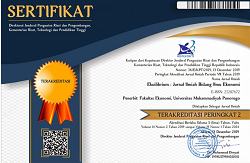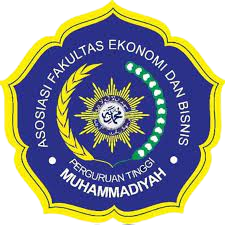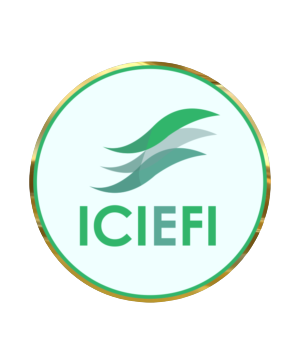Poverty Reduction through Local Financial Performance: Case Study in East Nusa Tenggara Province, Indonesia
DOI:
https://doi.org/10.24269/ekuilibrium.v15i2.2020.pp151-160Abstract
The high level of poverty in East Nusa Tenggara Province, Indonesia, requires effort to be alleviated. For instance, there is a need to enhance the financial management performance of the locals. Therefore this study analyzes the contribution of local financial performance to the poverty rate. It uses panel data regression analysis involving 22 regencies and municipalities from 2015 to 2018. The results of the study showed that the local financial independency ratio in various regencies and municipalities has fewer contributions to the poverty rate. Local governments need to increase regional fiscal capacity integrated with efforts to improve regional macroeconomic performance. Moreover, they should increase alignments toward poverty alleviation programs as well as the capacity of regional apparatus.
References
Amelia, R. (2012). Analisis Faktor-Faktor yang Mempengaruhi Kemiskinan di Provinsi Nusa Tenggara Timur. [Undergraduate thesis]. Departemen Ilmu Ekonomi, Fakultas Ekonomi dan Manajemen, Institut Pertanian Bogor. Available at https://repository.ipb.ac.id/handle/123456789/57478.
Ani, N.L.N.P, & Dwirandra, A.A.N.B. (2014). Pengaruh Kinerja Keuangan Daerah pada Pertumbuhan Ekonomi, Pengangguran, dan Kemiskinan Kabupaten dan Kota. E-Jurnal Akuntansi Universitas Udayana, 6(3), 481-497.
BPS [Badan Pusat Statistik]. (2020a). Kemiskinan dan Ketimpangan. Available at https://www.bps.go.id/subject/23/kemiskinan-dan-ketimpangan.html#subjekViewTab3.
BPS [Badan Pusat Statistik]. (2020b). Metadata Indikator. Available at https://sirusa.bps.go.id/sirusa/index.php/indikator/index.
BPS [Badan Pusat Statistik]. (2020c). Pembangunan Manusia. Available at https://ipm.bps.go.id/data/provinsi/metode/baru/5300.
BPS Prov. NTT [Badan Pusat Statistik Provinsi Nusa Tenggara Timur]. (2020a). Kemiskinan dan Ketimpangan. Available at: https://ntt.bps.go.id/subject/23/kemiskinan-dan-ketimpangan.html#subjekViewTab3.
BPS Prov. NTT [Badan Pusat Statistik Provinsi Nusa Tenggara Timur]. (2020b). Tenaga Kerja. Available at: https://ntt.bps.go.id/subject/6/tenaga-kerja.html#subjekViewTab3.
Bappenas [Kementerian Perencanaan Pembangunan Nasional/Badan Perencanaan Pembangunan Nasional]. (2017). Profil dan Analisis Daerah: Provinsi Nusa Tenggara Timur 2017. Jakarta: Kedeputian Bidang Pengembangan Regional.
Dartanto, T. (2012). Subsidi BBM, APBN, dan Kemiskinan di Indonesia: Isu Usang yang Tak Pernah Kunjung Padam. In Iluni FEUI (ed.). Dulu Mendengar Sekarang Bicara: Kumpulan Tulisan Ekonom Muda FEUI, Jakarta: Lembaga Penerbit Fakultas Ekonomi Universitas Indonesia.
Fanggidae, F.O., Salean, F.J., Ndaomanu, M., & Langoday, T.O. (2009). Analisa Pengeluaran Publik Nusa Tenggara Timur. Kupang: AusAid, Tim Antara, Bank Dunia dan Decentralization Support Facility for Eastern Indonesia. Available at: http://documents.worldbank.org/curated/en/248241468040149070/pdf/491860WP0BAHAS1BLIC10ntt1pea1bahasa.pdf.
Febiandani, R., & Suseno, D.A. (2016). Analisis Hubungan Kemandirian Keuangan Daerah dan Ketergantungan Daerah terhadap Pengangguran dan Kemiskinan. Economics Development Analysis Journal, 5(2), 217-225.
Fitriani, N.L.P., Dwirandra, A.A.N.B. (2014). Penilaian Kinerja Keuangan Daerah Kabupaten/kota di Provinsi Bali Tahun 2007-2011. E-Jurnal Akuntansi Universitas Udayana, 8(1), 211-227.
Hanifah, N.B., Kadir, S.A., & Yulianita, A. (2017). Analisis Kausalitas antara Pengeluaran Pemerintah dan Pertumbuhan Ekonomi di Pulau Sumatera. Jurnal Ekonomi Pembangunan, 15(1), 15-34.
Harmadi, S.H.B. (2013). Tantangan Penanggulangan Kemiskinan di Indonesia. Mini Economica: Media Komunikasi Ilmu Ekonomi, 42, 166-178.
Hendriyani, R.M., & Suartini, S. (2019). Implication of Implementing the New Local Taxes Regulation on the Regional Income of Badung Regency, Bali Province, Indonesia. International Journal of Sciences: Basic and Applied Research, 45(2), 168-180.
Junarwati, Basri, H., & Abdullah, S. (2013) Pengaruh Pendapatan Asli Daerah terhadap Kinerja Keuangan Daerah pada Kabupaten/Kota di Provinsi Aceh Tahun 2010-2012. Jurnal Telaah & Riset Akuntansi, 6(2), 186-193.
Kementerian Keuangan. (2020). APBD, Realisasi APBD, dan Neraca Setelah TA 2006. Directorate General of Fiscal Balance. Available at: http://www.djpk.kemenkeu.go.id/?p=5412.
Kiha, E.K., & Mitang, B.B. (2019). Faktor-Faktor yang Mempengaruhi Penduduk Miskin di Kecamatan Kota Kefamenanu Kabupaten Timor Tengah Utara. Jurnal Ekonomi Pembangunan, 4(2), 20-33.
Kumpangpune, N., Saerang, D.P.E., & Engka, D.S.M. (2019). Pengaruh Kinerja Keuangan Daerah terhadap Pertumbuhan Ekonomi serta Dampaknya terhadap Kemiskinan di Kota Bitung. Jurnal Pembanguan Ekonomi dan Keuangan Daerah, 20(2), 1-18.
Lestari, T.R.P. (2009). Implementasi Program Asuransi Kesehatan Masyarakat Miskin di Nusa Tenggara Timur. Jurnal Kesehatan Masyarakat Nasional, 3(6), 264-269.
Mahpudin, E., Santoso, M.P.T., & Huda, S. (2017). Analisis Implementasi Penganggaran Berbasis Kinerja terhadap Akuntabilitas Pemerintah Daerah: Studi pada Instansi Pemerintah Daerah. Jurnal Riset Keuangan dan Akuntansi, 3(2), 1-19.
Mahulae, P.J.M. (2018). Evaluasi Kinerja Keuangan Daerah Provinsi Sumatera Utara Periode Tahun 2009 s/d 2016. Inovasi: Jurnal Politik dan Kebijakan, 15(2), 125-136.
Nalle, F.W., & Kiha, E.K. (2018). Analisis Faktor-Faktor yang Mempengaruhi Tingkat Kemiskinan di Kecamatan Insana Kabupaten Timor Tengah Utara. Jurnal Dinamika Ekonomi Pembangunan, 1(3), 35-45.
Nugroho, & Rhamadhani. (2016). Pengaruh PDRB terhadap Tingkat Kemiskinan di Provinsi Sulawesi Tengah (Tahun 2013-2015). Jurnal Baabu Al-Ilmi: Ekonomi dan Perbankan Syariah, 1(2), 165-176.
Pilat, J.J., & Morasa, J. (2017). Analisis Rasio Keuangan Anggaran Pendapatan dan Belanja Daerah (APBD) Kota Manado untuk Menilai Kinerja Keuangan Pemerintah Kota Manado Tahun Anggaran 2011-2015. Jurnal Accountability, 6(1), 45-56.
Renggo, Y.R. (2017) Kausalitas antara Pertumbuhan Ekonomi dan Kemiskinan di Provinsi Nusa Tenggara Timur Tahun 2002-2015. Optimal: Jurnal Ekonomi dan Kewirausahaan, 11(1), 35-46.
Samputra, P.L., & Munandar, A.I. (2019). Korupsi, Indikator Makro Ekonomi, dan IPM terhadap Tingkat Kemiskinan di Indonesia. Jurnal Ekonomi Kuantitatif Terapan, 12(1), 35-46.
Seran, S. (2016). Pendidikan dan Pertumbuhan Ekonomi versus Kemiskinan Penduduk: Kasus Provinsi Nusa Tenggara Timur. Yogyakarta: Deepublish.
Siburian, R. (2009). Moral Ekonomi dan Belenggu Kemiskinan Masyarakat di Kabupaten Belu. Jurnal Penelitian dan Pengembangan Kesejahteraan Sosial, 14(1), 1-11.
Suartini, S. (2019). Local Financial Performance and Its Impact on Border Community Welfare. Mimbar: Journal of Social and Development, 35(2), 402-410.
Toda, H. (2016). Strategi Pemerintah Daerah dalam Penanggulangan Kemiskinan di Nusa Tenggara Timur. Jurnal Administrasi Publik, 7(1), 60-76.
Wibowo, A.R., & Khoirudin, R. (2019). Analysis of Determinants of Poor Population in Central Java 2008-2017, Ekuilibrium: Jurnal Ilmiah Bidang Ilmu Ekonomi, 14(1), 1-15.
Downloads
Published
How to Cite
Issue
Section
License
Retained Rights/Terms and Conditions of Publication
1. As an author you (or your employer or institution) may do the following:
- make copies (print or electronic) of the article for your own personal use, including for your own classroom teaching use;
- make copies and distribute such copies (including through e-mail) of the article to research colleagues, for the personal use by such colleagues (but not commercially or systematically, e.g. via an e-mail list or list server);
- present the article at a meeting or conference and to distribute copies of the article to the delegates attending such meeting;
- for your employer, if the article is a ‘work for hire’, made within the scope of your employment, your employer may use all or part of the information in the article for other intra-company use (e.g. training);
- retain patent and trademark rights and rights to any process, procedure, or article of manufacture described in the article;
- include the article in full or in part in a thesis or dissertation (provided that this is not to be published commercially);
- use the article or any part thereof in a printed compilation of your works, such as collected writings or lecture notes (subsequent to publication of the article in the journal); and prepare other derivative works, to extend the article into book-length form, or to otherwise re-use portions or excerpts in other works, with full acknowledgement of its original publication in the journal;
- may reproduce or authorize others to reproduce the article, material extracted from the article, or derivative works for the author's personal use or for company use, provided that the source and the copyright notice are indicated, the copies are not used in any way that implies RCEPM-LIPI endorsement of a product or service of any employer, and the copies themselves are not offered for sale.
All copies, print or electronic, or other use of the paper or article must include the appropriate bibliographic citation for the article's publication in the journal.
2. Requests from third parties
Although authors are permitted to re-use all or portions of the article in other works, this does not include granting third-party requests for reprinting, republishing, or other types of re-use. Requests for all uses not included above, including the authorization of third parties to reproduce or otherwise use all or part of the article.
3. Author Online Use
- Personal Servers. Authors and/or their employers shall have the right to post the accepted version of articles pre-print version of the article, or revised personal version of the final text of the article (to reflect changes made in the peer review and editing process) on their own personal servers or the servers of their institutions or employers without permission from Universitas Muhamamdiyah Ponorogo, provided that the posted version includes a prominently displayed Universitas Muhamamdiyah Ponorogo copyright notice and, when published, a full citation to the original publication, including a link to the article abstract in the journal homepage. Authors shall not post the final, published versions of their papers;
- Classroom or Internal Training Use. An author is expressly permitted to post any portion of the accepted version of his/her own articles on the author's personal web site or the servers of the author's institution or company in connection with the author's teaching, training, or work responsibilities, provided that the appropriate copyright, credit, and reuse notices appear prominently with the posted material. Examples of permitted uses are lecture materials, course packs, e-reserves, conference presentations, or in-house training courses;
- Electronic Preprints. Before submitting an article to an Ekuilibrium: Jurnal Ilmiah Bidang Ilmu Ekonomi, authors frequently post their manuscripts to their own web site, their employer's site, or to another server that invites constructive comment from colleagues. Upon submission of an article to Ekuilibrium: Jurnal Ilmiah Bidang Ilmu Ekonomi, an author is required to transfer copyright in the article to Economy Faculty Universitas Muhammadiyah Ponorogo, and the author must update any previously posted version of the article with a prominently displayed Economy Faculty Universitas Muhammadiyah Ponorogo copyright notice. Upon publication of an article by the Universitas Muhammadiyah Ponorogo, the author must replace any previously posted electronic versions of the article with either (1) the full citation to the work with a Digital Object Identifier (DOI) or link to the article abstract in Ekuilibrium: Jurnal Ilmiah Bidang Ilmu Ekonomi journal homepage, or (2) the accepted version only (not the final, published version), including the Economy Faculty Universitas Muhammadiyah Ponorogo copyright notice and full citation, with a link to the final, published article in journal homepage.
4. Articles in Press (AiP) service
Economy Faculty Universitas Muhammadiyah Ponorogo may choose to publish an abstract or portions of the paper before we publish it in the journal. Please contact our Production department immediately if you do not want us to make any such prior publication for any reason, including disclosure of a patentable invention.
5. Author/Employer Rights
If you are employed and prepared the article on a subject within the scope of your employment, the copyright in the article belongs to your employer as a work-for-hire. In that case, Economy Faculty Universitas Muhammadiyah Ponorogo assumes that when you sign this Form, you are authorized to do so by your employer and that your employer has consented to the transfer of copyright, to the representation and warranty of publication rights, and to all other terms and conditions of this Form. If such authorization and consent has not been given to you, an authorized representative of your employer should sign this Form as the Author.
6. RCEPM-LIPI Copyright Ownership
It is the formal policy of Economy Faculty Universitas Muhammadiyah Ponorogo to own the copyrights to all copyrightable material in its technical publications and to the individual contributions contained therein, in order to protect the interests of the Economy Faculty Universitas Muhammadiyah Ponorogo, its authors and their employers, and, at the same time, to facilitate the appropriate re-use of this material by others. Economy Faculty Universitas Muhammadiyah Ponorogo distributes its technical publications throughout the world and does so by various means such as hard copy, microfiche, microfilm, and electronic media. It also abstracts and may translate its publications, and articles contained therein, for inclusion in various compendiums, collective works, databases and similar publication.
7. Licensing Terms
Ekuilibrium is licensed under a Creative Commons Attribution-ShareAlike 4.0 International License.
Permissions beyond the scope of this license may be available at https://journal.umpo.ac.id/













